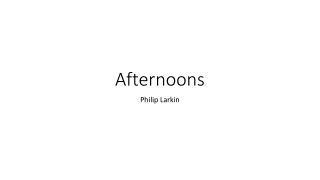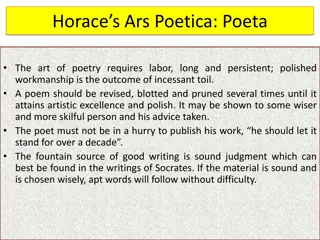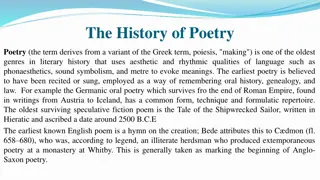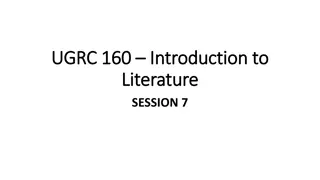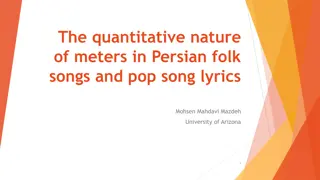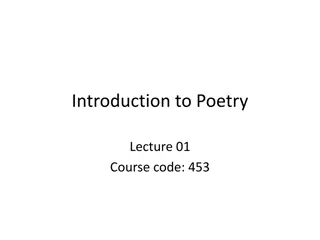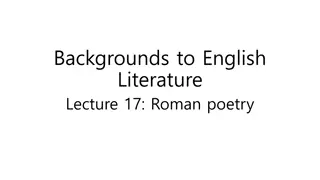The Life and Poetry of Philip Larkin
Philip Larkin, born in Coventry in 1922, was a renowned English poet. Despite his poor eyesight preventing him from joining the army during World War II, Larkin pursued his passion for writing. He excelled in poetry, with his works gaining recognition in national publications. Larkin's professional journey as a librarian and novelist further shaped his literary career, with his collections like "The Less Deceived" solidifying his status as a prominent figure in 20th-century poetry.
Download Presentation

Please find below an Image/Link to download the presentation.
The content on the website is provided AS IS for your information and personal use only. It may not be sold, licensed, or shared on other websites without obtaining consent from the author.If you encounter any issues during the download, it is possible that the publisher has removed the file from their server.
You are allowed to download the files provided on this website for personal or commercial use, subject to the condition that they are used lawfully. All files are the property of their respective owners.
The content on the website is provided AS IS for your information and personal use only. It may not be sold, licensed, or shared on other websites without obtaining consent from the author.
E N D
Presentation Transcript
Biography Philip Arthur Larkin was born on August 9, 1922, in Coventry. He attended the City s King Henry VIII School between 1930 and 1940, and made regular contributions to the school magazine, The Coventrian, which, between 1939 and 1940, he also helped to edit . Later he studied at St. John s College, Oxford
Philip Larkin Despite the war he was able to complete his degree without interruption, graduating in 1943 with First Class Honours in English. Larkin had failed his army medical because of his poor eyesight. His closest friends at Oxford were Kingsley Amis and Bruce Montgomery.
His First Poems The first of his poems to be published in a national weekly was Ultimatum , which appeared in the Listener, November 28, 1940. Then in June 1943, three of his poems were published in Oxford Poetry (1942- 43): 1. A Stone Church Damaged By A Bomb , 2. Mythological Introduction 3. I dreamed of an out-thrust arm of land .
After Graduation Larkin lived with his parents for a while, before being appointed Librarian at Wellington, Shropshire, in November of 1943. Here, he studied to qualify as a professional librarian, but continued to write and publish. In 1945, ten of his poems, which later that year would be included in The North Ship, appeared in Poetry from Oxford in Wartime.
Publishing Two novels, Jill and A Girl in Winter were published in 1946 and 1947 respectively. Larkin became assistant Librarian at the University College of Leicester. He completed his professional studies and became an Associate of the Library Association in 1949. Sub-Librarian at Queen s University, Belfast
Poetry It was in Belfast that he applied fresh vigourto his poetry activities, and, in 1951, had a small collection, XX Poems, privately printed in an edition of 100 copies. Also, in 1954, the Fantasy Press published a pamphlet containing five of his poems. The Marvell Press, based in Hessle, near Hull, published Toads and Poetry of departures in Listen. It would be the Marvell Press that published his next collection The Less Deceived.
Poetry Larkin took up the position of Librarian at the University of Hull on March 21, 1955, and it was in October of that year that The Less Deceivedwas published. It was this collection that would be the foundation of his reputation as one of the foremost figures in 20th Century poetry.
Poetry It wasn t until 1964 that his next collection,The Whitsun Weddings was published. Again, the collection was well received, and widely acclaimed, and the following year, Larkin was awarded the Queen s Gold Medal for Poetry. CREDITS: This presentation template was created by Slidesgo, including icons by Flaticon, and infographics & images by Freepik.
Resources His last collection High Windows was published in 1974, and confirmed him as one of the finest poets in English Literary history. In 1970 under the title All What Jazz: a record diary 1961-1968. He also edited the Oxford Book of Twentieth Century English Verse, which was published in 1973. Aubade , his last great poem, was published in The Times Literary Supplement in December 1977. A collection of his essays and reviews was published in November 1983 as Required Writing: miscellaneous pieces 1955-1982, and won the W.H. Smith Literary Award for 1984.
Awards and job Larkin received many awards in recognition of his writing, especially in his later years. In 1982 the University of Hull made him a Professor. In 1984 he received an honorary D.Litt. from Oxford University, and was elected to the Board of the British Library. CREDITS: This presentation template was created by Slidesgo, including icons by Flaticon, and infographics & images by Freepik.
In mid 1985 Larkin was admitted to hospital with an illness in his throat, and on June 11 an operation was carried out to remove his oesophagus. His health was deteriorating, and when he was awarded the much prized Order of the Companion of Honourhe was unable, because of ill health, to attend the investiture, which was due to take place at Buckingham Palace on November 25. He received the official notification courtesy of the Royal Mail. Philip Larkin died of cancer on December 2 1985. He was 63 years old.
The Movement The Movement was a term coined in 1954 by J. D. Scott,literary editor ofThe Spectator, to describe a group of writers including Philip Larkin, Kingsley Amis, Donald Davie, D. J. Enright, John Wain, Elizabeth Jennings, Thom Gunn and Robert Conquest. To these poets, good poetry meant simple, sensuous content and traditional, conventional and dignified form. The group's objective was to prove the importance of English poetryover the new modernist poetry.
The Movement The members of the Movement were not anti-modernists; they were opposed to modernism, which was reflected in the Englishness of their poetry. The Movement sparked the divisions among different types of British poetry. Their poems were nostalgic for the earlier Britain and filled with pastoral images of the decaying way of life as Britain moved farther from the rural and more towards the urban.
The Group The Group was an informal group of poets who met in London from the mid- 1950s to the mid-1960s. As a poetic movement in Great Britain it is often seen as being the successor to The Movement. But this movement take place in some cities along the time, like in Cambridge that in November.
The Group 1952 while at Downing College, Cambridge University, Philip Hobsbaumalong with two friends, Tony Davis and Neil Morris, dissatisfied with the way poetry was read aloud in the university. Decided to place a notice in the undergraduate newspaper Varsity for people interested in forming a poetry discussion group. Five others, came along to the first meeting.
The Group Another city was London that when Hobsbaum moved to there, the discussion group reconstituted itself in this city. It is this Londongroup that is now referred to as The Group. The poets gathered to discuss each other's work, putting into practice the sort of analysis and objective comment in keeping with the principles ofHobsbaum's Cambridge tutor F. R. Leavis and of the New Criticism in general . Another city where this movement take place too was Belfast bit there it was called as The Belfast Group.
His First Poems The first of his poems to be published in a national weekly was Ultimatum , which appeared in the Listener, November 28, 1940. Then in June 1943, three of his poems were published in Oxford Poetry (1942- 43): 1. A Stone Church Damaged By A Bomb , 2. Mythological Introduction 3. I dreamed of an out-thrust arm of land .
The Explosion by Philip Larkin On the day of the explosion At noon there came a tremor; cows Stopped chewing for a second; sun Scarfed as in a heat-haze dimmed. Shadows pointed towards the pithead. In the sun the slagheap slept. The dead go on before us, they Are sitting in God's house in comfort, We shall see them face to face-- Down the lane came men in pitboots plain as lettering in the chapels It was said and for a second Wives saw men of the explosion Coughing oath-edged talk and pipe-smoke, Shouldering off the freshened silence. Larger than in life they managed-- Gold as on a coin or walking Somehow from the sun towards them One chased after rabbits; lost them; Came back with a nest of lark's eggs; One showing the eggs unbroken. Showed them; lodged them in the grasses. https://www.youtube.com/watch?v=5sMxncSFoR0&a b_channel=FarrarStraus%26Giroux
The Explosion In his poem The Explosion, Philip Larkin discusses the dramatic event of the mine disaster observed in 1969. This poem is the elegy to remember the tragedy of the explosion. Thus, the main themes discussed by the author are life and death, and the main idea is the victory of life over death in spite of the experienced tragedy.
The Days by Philip Larkin What are days for? Days are where we live. They come, they wake us Time and time over. They are to be happy in: Where can we live but days? Ah, solving that question Brings the priest and the doctor In their long coats https://www.youtube.com/watch?v=ZKaNRYWqJns& ab_channel=ThanasisPanou Running over the fields.
The Days Days is written in free verse, with no rhyme scheme or regular metre Days reflects, in a rather matter-of-fact way, on the deepest of questions: what s it all about? and what is the meaning of life? The terms of days , rather than life or existence in general, points up an important and recurring theme for Larkin s poetry: the daily ritual of work, the day-to-day business of living.
The Days Days are, we are told, where we live and they are for being happy in: the upbeat, almost childlike catechism of this first stanza seems coyly innocent of the day-to-day realities of drudgery and work. There is nowhere we can live but in days that is, in the daily cycle of work and being a functioning member of society unless we re mad or dead. The second stanza of Larkin s poem characteristically combines the faintly comic (the priest and doctor in their long coats) with more morbid subject matter.


